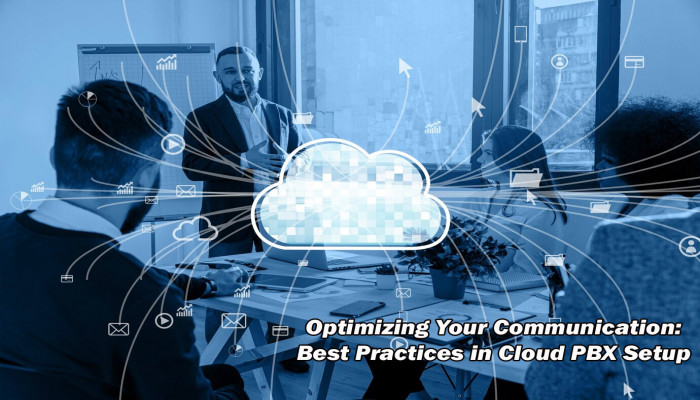 Launch apps instantly. Claim $200 credits on DigitalOcean
Launch apps instantly. Claim $200 credits on DigitalOcean
Optimizing Your Communication: Best Practices in Cloud PBX Setup
Written by vitelglobal » Updated on: March 29th, 2024

With the rise of remote work and distributed teams, companies are turning to hosted cloud PBX providers for streamlined communication services. However, optimizing your communication goes beyond just setting up a hosted cloud PBX system. It involves understanding best practices and ensuring VoIP security to its fullest potential.
Hosted cloud PBX providers offer businesses a scalable and flexible solution for their communication needs. By moving away from traditional on-premises systems, companies can benefit from reduced costs, improved reliability, and enhanced features. When selecting a provider, consider factors such as uptime guarantees, customer support, and integration capabilities to ensure seamless operations.
Best Practices for Cloud PBX Setup:
Setting up a Cloud PBX (Private Branch Exchange) system for your business requires careful planning and execution to ensure it meets your specific needs and operates smoothly.
Customize Your Setup:
Call Routing: Determine how incoming calls will be routed within your organization based on factors such as time of day, caller ID, or specific departmental needs.
Voicemail Greetings: Customize voicemail greetings to reflect your brand identity and provide relevant information to callers.
Call Forwarding Rules: Establish rules for call forwarding to ensure that calls are directed to the appropriate individuals or departments, especially during off-hours or when specific team members are unavailable.
Train Your Team:
Provide comprehensive training to your employees on how to use the cloud PBX system effectively. This training should cover basic functionalities such as making and receiving calls, transferring calls, setting up voicemail, and utilizing advanced features like conference calling or call recording.
Offer ongoing support and resources to help employees troubleshoot any issues or questions they may have about the system.
Regular Maintenance:
Schedule regular maintenance and updates for your cloud PBX system to ensure it remains secure, reliable, and up-to-date with the latest features and security patches.
Regularly review and optimize call routing configurations and voicemail settings to adapt to changing business needs or improvements in technology.
Monitor Performance:
Utilize analytics and reporting tools provided by your cloud PBX service provider to monitor the Performance of your communication system.
Track metrics such as call volume, call duration, wait times, and customer satisfaction scores to identify trends and areas for improvement.
Use this data to make informed decisions about system optimization, resource allocation, and training initiatives.
Additionally, consider the scalability of your cloud PBX system to accommodate future growth or changes in your organization. Ensure that the chosen provider offers flexible pricing plans and support for additional users or features as needed.
By following these best practices, you can ensure that your cloud PBX system is tailored to your business requirements, effectively utilized by your team, well-maintained for optimal Performance, and continuously monitored for improvements.
Ensuring VoIP Security:
Transitioning to Voice over Internet Protocol brings many advantages in communication efficiency and flexibility, but it also introduces security concerns due to the reliance on Internet infrastructure. To ensure VoIP security communications, several best practices must be implemented to safeguard your communication:
Encrypt Data: Encrypting voice data is crucial to prevent interception and eavesdropping by unauthorized parties. Encryption converts the voice data into a secure format that can only be understood by authorized recipients. Secure encryption protocols such as Transport Layer Security (TLS) or Secure Real-time Transport Protocol (SRTP) will be implemented to protect both signalling and media traffic. These protocols ensure end-to-end encryption, securing communication channels from potential threats.
Implement Access Controls: Limiting access to the cloud Private Branch Exchange (PBX) system to authorized users only is essential for maintaining security. Implement robust access controls such as user authentication mechanisms, role-based access controls (RBAC), and multi-factor authentication (MFA). By enforcing strict access policies, organizations can prevent unauthorized individuals from gaining entry to the VoIP system and accessing sensitive communication data.
Regular Audits: Conducting regular security audits is necessary to identify and address vulnerabilities within the VoIP infrastructure. Security audits involve comprehensive assessments of the VoIP system's configuration, network architecture, and access controls to identify potential weaknesses or security gaps. Through periodic audits, organizations can proactively detect and mitigate security threats. Additionally, compliance audits with relevant standards such as the Payment Card Industry Data Security Standard (PCI DSS) or the Health Insurance Portability and Accountability Act (HIPAA) may be necessary for regulatory compliance.
Use Strong Passwords: Enforcing strong password policies is fundamental in preventing unauthorized access to VoIP systems. Additionally, mandates regular password updates and discourages the reuse of passwords across multiple accounts. Employing password management tools and implementing account lockout mechanisms can further enhance password security and thwart brute-force attacks.
By implementing these best practices, organizations can mitigate security risks and safeguard their VoIP communications against potential threats and vulnerabilities. Additionally, staying abreast of emerging security trends and technologies is essential to adapting security measures accordingly and maintaining robust protection.
Exploiting Business Communication Services:
In addition to basic telephony features, many hosted cloud PBX providers offer advanced business communication services. These may include:
Unified Communications: Integrate voice, video, and messaging into a single platform for seamless collaboration.
CRM Integration: Integrate your cloud PBX system with customer relationship management (CRM) software for improved customer interactions.
Virtual Receptionist: Automate attendants to greet callers and route them to the appropriate department or extension.
Frequently Asked Questions:
1Q: Can I keep my existing phone numbers when switching to a cloud PBX system?
A: Yes, most hosted cloud PBX providers offer number porting services to transfer your existing phone numbers.
2Q: How reliable are hosted cloud PBX systems?
A: Hosted cloud PBX systems are highly reliable, with many providers offering uptime guarantees of 99.9% or higher.
3Q: Is VoIP secure for business use?
A: With proper security measures in place, VoIP can be just as secure as traditional landline systems.
Conclusion:
Optimizing your communication with hosted cloud PBX providers involves understanding best practices, ensuring VoIP security, and leveraging advanced business communication services. By following these guidelines, businesses can streamline their operations, improve collaboration, and enhance customer interactions.
Copyright © 2024 IndiBlogHub.com Hosted on Digital Ocean









Post a Comment
To leave a comment, please Login or Register